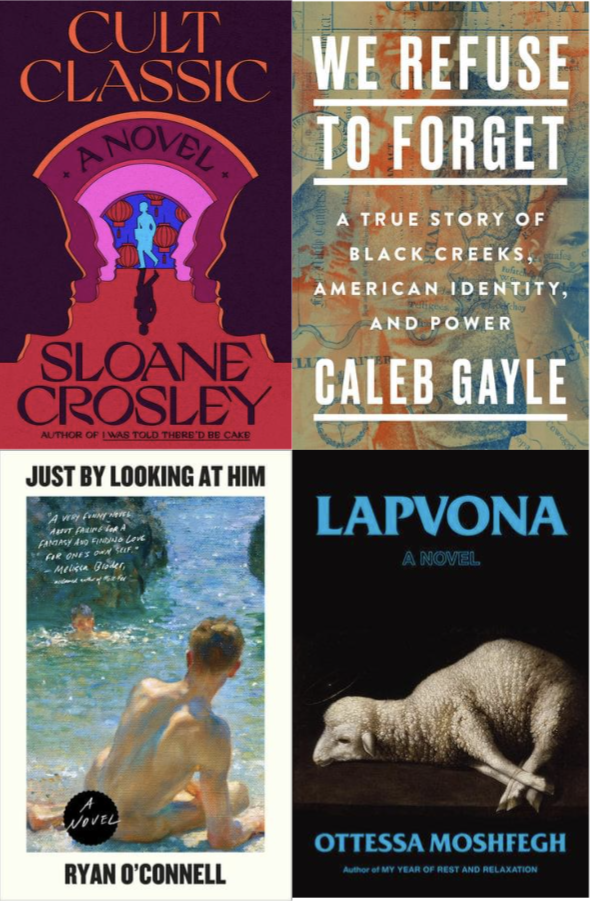We wouldn’t dream of abandoning our vast semi–annual Most Anticipated Book Previews, but we thought a monthly reminder would be helpful (and give us a chance to note titles we missed the first time around). Here’s what we’re looking out for this month. Let us know what you’re looking forward to in the comments!
Want to know about the books you might have missed? Then go read our most recent book preview. Want to help The Millions keep churning out great books coverage? Then sign up to be a member today.
 Blithedale Canyon by Michael Bourne: The Millions’ own Michael Bourne publishes his debut novel, Blithedale Canyon, following the down-and-out Trent Wolfer who comes out of rehab and lands in his hometown near the San Francisco Bay, running into a beautiful woman he knew long ago, now a single mother of two. The novel chronicles the pull of home and the way a place changes over time, and it paints a portrait of a man trying very hard to get something right. Teddy Wayne says the novel “is an ode to the pleasures and pains of the return to the familiar, to the gravitational pulls of addiction, old friends, and Springsteen on a car stereo, but mostly of home. Blithedale Canyon is a tenderly nostalgic and page-turning portrait of a man who can’t control his worst impulses, written by an author in full command of his own tools.” (Lydia)
Blithedale Canyon by Michael Bourne: The Millions’ own Michael Bourne publishes his debut novel, Blithedale Canyon, following the down-and-out Trent Wolfer who comes out of rehab and lands in his hometown near the San Francisco Bay, running into a beautiful woman he knew long ago, now a single mother of two. The novel chronicles the pull of home and the way a place changes over time, and it paints a portrait of a man trying very hard to get something right. Teddy Wayne says the novel “is an ode to the pleasures and pains of the return to the familiar, to the gravitational pulls of addiction, old friends, and Springsteen on a car stereo, but mostly of home. Blithedale Canyon is a tenderly nostalgic and page-turning portrait of a man who can’t control his worst impulses, written by an author in full command of his own tools.” (Lydia)
 Lapvona by Ottessa Moshfegh: Since her debut in 2015 with the disquieting but darkly funny novel Eileen, Moshfegh has proven herself to be one of the most immaculate crafters of disturbed, unreliable first-person narrators. From the nameless performance artist in My Year of Rest and Relaxation who drugs herself into a coma to the disturbed widow investigating a murder that may or may not have happened in Death in Her Hands, Moshfegh’s voice is part Dostoevsky, part Poe, and entirely her own, as filtered through a jaundiced millennial sensibility. If anybody would be apt to get into the weird head space of our current moment it’s Moshfegh, who in her new novel, Lapvona, written during Covid lockdown, ironically imagines a medieval setting of depraved feudal lords and witchy, cunning women. Fantasy might seem more the realm of a Robert Jordan than Moshfegh (the title of the book is the imagined kingdom where the narrative is set), but as the author told Vox, “In a time where there has been so much trauma and loss…Humanity finds purpose where it can. It’s like flowers growing out of the cracks in the sidewalk.” (Ed)
Lapvona by Ottessa Moshfegh: Since her debut in 2015 with the disquieting but darkly funny novel Eileen, Moshfegh has proven herself to be one of the most immaculate crafters of disturbed, unreliable first-person narrators. From the nameless performance artist in My Year of Rest and Relaxation who drugs herself into a coma to the disturbed widow investigating a murder that may or may not have happened in Death in Her Hands, Moshfegh’s voice is part Dostoevsky, part Poe, and entirely her own, as filtered through a jaundiced millennial sensibility. If anybody would be apt to get into the weird head space of our current moment it’s Moshfegh, who in her new novel, Lapvona, written during Covid lockdown, ironically imagines a medieval setting of depraved feudal lords and witchy, cunning women. Fantasy might seem more the realm of a Robert Jordan than Moshfegh (the title of the book is the imagined kingdom where the narrative is set), but as the author told Vox, “In a time where there has been so much trauma and loss…Humanity finds purpose where it can. It’s like flowers growing out of the cracks in the sidewalk.” (Ed)
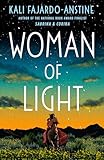 Woman of Light by Kali Fajardo-Anstine: A multigenerational western saga about a “wildly entertaining and complex family,” Fajardo-Anstine’s debut novel has been described as a “cinematic, epic story” written in “lyrical, unpretentious prose.” Set in 1930s Denver, the novel is centered around Luz Lopez, who becomes the seer and keeper of her Latinx and Indigenous family stories. (Sonya)
Woman of Light by Kali Fajardo-Anstine: A multigenerational western saga about a “wildly entertaining and complex family,” Fajardo-Anstine’s debut novel has been described as a “cinematic, epic story” written in “lyrical, unpretentious prose.” Set in 1930s Denver, the novel is centered around Luz Lopez, who becomes the seer and keeper of her Latinx and Indigenous family stories. (Sonya)
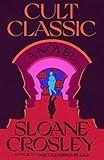 Cult Classic by Sloane Crosley: On a quiet night out with friends, Lola, a soon-to-be-married New Yorker, ducks out for cigarettes and runs into an old boyfriend. And then another. And … another. What at first seems like mere coincidence turns into something far stranger as Lola must contend not only with the viability of her current relationship but the fact that her former boss, a magazine editor-turned-guru, might have an unhealthy investment in the outcome. “Cult Classic is a romantic comedy set in a new age mind control cult on the Lower East Side,” Crosley told Entertainment Weekly. “My hope is that what sets it apart from every other romantic comedy set in a new age mind control cult on the Lower East Side is that it’s also a mystery.” (Michael)
Cult Classic by Sloane Crosley: On a quiet night out with friends, Lola, a soon-to-be-married New Yorker, ducks out for cigarettes and runs into an old boyfriend. And then another. And … another. What at first seems like mere coincidence turns into something far stranger as Lola must contend not only with the viability of her current relationship but the fact that her former boss, a magazine editor-turned-guru, might have an unhealthy investment in the outcome. “Cult Classic is a romantic comedy set in a new age mind control cult on the Lower East Side,” Crosley told Entertainment Weekly. “My hope is that what sets it apart from every other romantic comedy set in a new age mind control cult on the Lower East Side is that it’s also a mystery.” (Michael)
 Horse by Geraldine Brooks: Pulitzer Prize winner Brooks’ newest novel is based on the true story of Lexington, the record-breaking 19th century thoroughbred. The novel, which alternates between 2019 Washington D.C. and 1850s Lexington, Kentucky, follows Theo, a Black graduate student, discovers a forgotten equestrian painting. In writing about the artwork for Smithsonian magazine, the secret history of the horse and its enslaved stableman come to light. Kirkus’ starred review says: “Strong storytelling in service of a stinging moral message.” (Carolyn)
Horse by Geraldine Brooks: Pulitzer Prize winner Brooks’ newest novel is based on the true story of Lexington, the record-breaking 19th century thoroughbred. The novel, which alternates between 2019 Washington D.C. and 1850s Lexington, Kentucky, follows Theo, a Black graduate student, discovers a forgotten equestrian painting. In writing about the artwork for Smithsonian magazine, the secret history of the horse and its enslaved stableman come to light. Kirkus’ starred review says: “Strong storytelling in service of a stinging moral message.” (Carolyn)
 One’s Company by Ashley Hutson: After a series of life changing tragedies, Bonnie seeks to escape her reality by obsessively watching reruns of Three’s Company, her favorite show, in her trailer. When Bonnie buys a winning lottery ticket, she knows exactly what to do with her winnings: build an exact replica of the Three’s Company apartment—and spend her days acting as the show’s main characters. About Huston’s debut novel, Amber Sparks writes: “This book is such a savvy, deadpan, moving meditation-unto-absurdity on obsession and trauma and throwaway television and the ways that our hobbies can hurt us and heal us and sometimes overwhelm us. I absolutely loved it.” (Carolyn)
One’s Company by Ashley Hutson: After a series of life changing tragedies, Bonnie seeks to escape her reality by obsessively watching reruns of Three’s Company, her favorite show, in her trailer. When Bonnie buys a winning lottery ticket, she knows exactly what to do with her winnings: build an exact replica of the Three’s Company apartment—and spend her days acting as the show’s main characters. About Huston’s debut novel, Amber Sparks writes: “This book is such a savvy, deadpan, moving meditation-unto-absurdity on obsession and trauma and throwaway television and the ways that our hobbies can hurt us and heal us and sometimes overwhelm us. I absolutely loved it.” (Carolyn)
 Patricia Wants to Cuddle by Samantha Allen: In Allen’s (Real Queer America) debut novel, four women compete in a Bachelor-style dating competition on a remote island in the Pacific Northwest. As the finale creeps closer, there are sightings of a misunderstood, local creature named Patricia—and she begins to hunt for a connection all her own. About the horror comedy, Jacob Tobia says: “To die for. Samantha Allen has filled each page with unadulterated, unbridled, unhinged genius.” (Carolyn)
Patricia Wants to Cuddle by Samantha Allen: In Allen’s (Real Queer America) debut novel, four women compete in a Bachelor-style dating competition on a remote island in the Pacific Northwest. As the finale creeps closer, there are sightings of a misunderstood, local creature named Patricia—and she begins to hunt for a connection all her own. About the horror comedy, Jacob Tobia says: “To die for. Samantha Allen has filled each page with unadulterated, unbridled, unhinged genius.” (Carolyn)
 Fruiting Bodies by Kathryn Harlan: Blending the magical, gothic, and uncanny, the eight stories in Harlan’s debut collection explore characters—primarily queer women—who are navigating a world on the brink. “In the spirit of Shirley Jackson, Kathryn Harlan coaxes their characters’ secret feelings into the open, where they bloom into compelling dramas,” writes CJ Hauser. “A book as loving as it is eerie, full of queer love and queer longing, I so enjoyed my stay in the deep woods of Harlan’s imagination.” (Carolyn)
Fruiting Bodies by Kathryn Harlan: Blending the magical, gothic, and uncanny, the eight stories in Harlan’s debut collection explore characters—primarily queer women—who are navigating a world on the brink. “In the spirit of Shirley Jackson, Kathryn Harlan coaxes their characters’ secret feelings into the open, where they bloom into compelling dramas,” writes CJ Hauser. “A book as loving as it is eerie, full of queer love and queer longing, I so enjoyed my stay in the deep woods of Harlan’s imagination.” (Carolyn)
 The Scent of Burnt Flowers by Blitz Bazawule: Guggenheim fellow and multidisciplinary artist Bazawule’s debut novel is set in 1960s America. After they have defended themselves from an attack by racists, Melvin and his fiancé Bernadette must flee the country with the help from friends. With the FBI hot on their trail, they travel to Ghana with the hope of receiving asylum. Yrsa Daley-Ward calls the novel “a colorful, delicious ride through the senses and beyond; a tale of danger, love, and all the small, true things that will not be named.” (Carolyn)
The Scent of Burnt Flowers by Blitz Bazawule: Guggenheim fellow and multidisciplinary artist Bazawule’s debut novel is set in 1960s America. After they have defended themselves from an attack by racists, Melvin and his fiancé Bernadette must flee the country with the help from friends. With the FBI hot on their trail, they travel to Ghana with the hope of receiving asylum. Yrsa Daley-Ward calls the novel “a colorful, delicious ride through the senses and beyond; a tale of danger, love, and all the small, true things that will not be named.” (Carolyn)
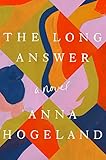 The Long Answer by Anna Hogeland: In her metafictional debut novel, Hogeland’s eponymous protagonist receives a call from her sister Margot who has just had a miscarriage. Anna, who is pregnant with her first child, begins having conversations with friends old and new about their own journeys with motherhood, abortion, menopause, and loss. Kirkus’ starred review calls the novel “a startling meditation on grief and family and betrayal and the stories we tell about ourselves.” (Carolyn)
The Long Answer by Anna Hogeland: In her metafictional debut novel, Hogeland’s eponymous protagonist receives a call from her sister Margot who has just had a miscarriage. Anna, who is pregnant with her first child, begins having conversations with friends old and new about their own journeys with motherhood, abortion, menopause, and loss. Kirkus’ starred review calls the novel “a startling meditation on grief and family and betrayal and the stories we tell about ourselves.” (Carolyn)
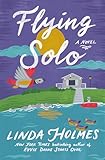 Flying Solo by Linda Holmes: Nearly 40 and fresh off a broken engagement, Laurie returns to her hometown in Maine to settle the estate of her late great-aunt Dot. Enlisting the help of professional antique dealers and her former high school boyfriend, Laurie seeks to unravel the mystery behind a wooden duck she discovers among her aunt’s belongings. Carola Lovering writes: “Holmes’s sophomore novel is a wise, heartwarming story of family, unexpected romance, and shaping your own path in a world where it often feels next to impossible to do so.” (Carolyn)
Flying Solo by Linda Holmes: Nearly 40 and fresh off a broken engagement, Laurie returns to her hometown in Maine to settle the estate of her late great-aunt Dot. Enlisting the help of professional antique dealers and her former high school boyfriend, Laurie seeks to unravel the mystery behind a wooden duck she discovers among her aunt’s belongings. Carola Lovering writes: “Holmes’s sophomore novel is a wise, heartwarming story of family, unexpected romance, and shaping your own path in a world where it often feels next to impossible to do so.” (Carolyn)
 The Girls in Queens by Christine Kandic Torres: Told in alternating timelines, Torres’ debut novel is a coming of age tale about two Latinx best friends, Brisma and Kelly, growing up in Queens. In present day, Brisma, Kelly, and Brisma’s boyfriend, Brian, are reunited, and sparks between old lovers begin to fly again. However, the women’s friendship is put to the test when Brian is accused of sexual assault—and one of them doesn’t believe in his innocence. Publishers Weekly’s starred review says “Torres hits every note perfectly” in her “incisive and keenly observed” debut. (Carolyn)
The Girls in Queens by Christine Kandic Torres: Told in alternating timelines, Torres’ debut novel is a coming of age tale about two Latinx best friends, Brisma and Kelly, growing up in Queens. In present day, Brisma, Kelly, and Brisma’s boyfriend, Brian, are reunited, and sparks between old lovers begin to fly again. However, the women’s friendship is put to the test when Brian is accused of sexual assault—and one of them doesn’t believe in his innocence. Publishers Weekly’s starred review says “Torres hits every note perfectly” in her “incisive and keenly observed” debut. (Carolyn)
 We Refuse to Forget by Caleb Gayle: Award-winning journalist Gale’s digs deep into the history of the Creek Nation, a native tribe that owned slaves but also extended citizenship to Black people, and Cow Tom, a Black Creek citizen who eventually became its chief. Unfortunately, the tribal leaders revoked citizenship from Black Creek members (including Cow Tom and his ancestors) in the 1970s; in this book, Gayle explores how and why this happened—and the ways white supremacy seeks to divide and damage above all else. About the book, David Treuer says, “[Gayle] tells a complicated story of the past and in doing so sheds light on the ways our fantasies of race endure and are, gradually, being undone.” (Carolyn)
We Refuse to Forget by Caleb Gayle: Award-winning journalist Gale’s digs deep into the history of the Creek Nation, a native tribe that owned slaves but also extended citizenship to Black people, and Cow Tom, a Black Creek citizen who eventually became its chief. Unfortunately, the tribal leaders revoked citizenship from Black Creek members (including Cow Tom and his ancestors) in the 1970s; in this book, Gayle explores how and why this happened—and the ways white supremacy seeks to divide and damage above all else. About the book, David Treuer says, “[Gayle] tells a complicated story of the past and in doing so sheds light on the ways our fantasies of race endure and are, gradually, being undone.” (Carolyn)
 God’s Children Are Little Broken Things is Out by Arinze Ifeakandu: A young woman reunites with her late father’s partner whom she resents. A rising musician must negotiate his identity in the face of fame. As their families and society threatens to tear them apart, two young men struggle to stay together. In the nine stories in his debut collection, Ifeakandu, A Public Space Writing Fellow, writes about queer love, joy, and sorrow in contemporary Nigeria. “Although he writes about queer lives and loves in Nigeria, Arinze Ifeakandu’s voice is sensually alert to the human and universal in every situation,” says Damon Galgut. “These quietly transgressive stories are the work of a brilliant new talent.” (Carolyn)
God’s Children Are Little Broken Things is Out by Arinze Ifeakandu: A young woman reunites with her late father’s partner whom she resents. A rising musician must negotiate his identity in the face of fame. As their families and society threatens to tear them apart, two young men struggle to stay together. In the nine stories in his debut collection, Ifeakandu, A Public Space Writing Fellow, writes about queer love, joy, and sorrow in contemporary Nigeria. “Although he writes about queer lives and loves in Nigeria, Arinze Ifeakandu’s voice is sensually alert to the human and universal in every situation,” says Damon Galgut. “These quietly transgressive stories are the work of a brilliant new talent.” (Carolyn)
 Exalted by Anna Dorn: Dorn’s sophomore novel (after Vagablonde) follows Emily, an uber-popular, millennial astrology Instagrammer, and Dawn, a lonely Gen-X lesbian and @Exalted superfan. Both women are yearning—for fame and love; for visibility and connection—and when their paths unexpectedly cross they learn the cost of getting (or not getting) what you want. Our own Edan Lepucki says, “Clear your schedule and consult your horoscope because Anna Dorn’s novel will make you cackle and gasp, and you won’t be able to put it down.” (Carolyn)
Exalted by Anna Dorn: Dorn’s sophomore novel (after Vagablonde) follows Emily, an uber-popular, millennial astrology Instagrammer, and Dawn, a lonely Gen-X lesbian and @Exalted superfan. Both women are yearning—for fame and love; for visibility and connection—and when their paths unexpectedly cross they learn the cost of getting (or not getting) what you want. Our own Edan Lepucki says, “Clear your schedule and consult your horoscope because Anna Dorn’s novel will make you cackle and gasp, and you won’t be able to put it down.” (Carolyn)
 Another Love Discourse by Edie Meidav: Meidav’s (Kingdom of the Young) newest novel follows a writer as she sinks into an obsession with the life and work of 1960s French philosopher Roland Barthes. Set over the course of a year, she attempts to navigate her divorce, the beginnings of new love, grief, motherhood, and how to live in a world on the edge of collapse. Claire Messud writes: “Another Love Discourse shatters boundaries and expectations: Meidav’s narrative voice—urgent, lyrical, raw—compels the reader into uncommon and intense intimacy.” (Carolyn)
Another Love Discourse by Edie Meidav: Meidav’s (Kingdom of the Young) newest novel follows a writer as she sinks into an obsession with the life and work of 1960s French philosopher Roland Barthes. Set over the course of a year, she attempts to navigate her divorce, the beginnings of new love, grief, motherhood, and how to live in a world on the edge of collapse. Claire Messud writes: “Another Love Discourse shatters boundaries and expectations: Meidav’s narrative voice—urgent, lyrical, raw—compels the reader into uncommon and intense intimacy.” (Carolyn)
 Papers by Violaine Schwartz (translated by Christine Gutman): Alongside hearing testimony, newspaper clippings, and bureaucratic paperwork, French novelist Schwartz gathers interviews with asylum seekers in France to reveal the brutality of systems and resilience of humanity. Nafkote Tamirat says: “We are introduced to a kaleidoscope of peoples and experiences, their stories building up and out to reveal a broader landscape of pain, disappointment, humor, and kindness, ultimately portraying the grave realities of this system as well as the victories that are possible if, and only if, we refuse to accept institutional and governmental indifference and bigotry.” (Carolyn)
Papers by Violaine Schwartz (translated by Christine Gutman): Alongside hearing testimony, newspaper clippings, and bureaucratic paperwork, French novelist Schwartz gathers interviews with asylum seekers in France to reveal the brutality of systems and resilience of humanity. Nafkote Tamirat says: “We are introduced to a kaleidoscope of peoples and experiences, their stories building up and out to reveal a broader landscape of pain, disappointment, humor, and kindness, ultimately portraying the grave realities of this system as well as the victories that are possible if, and only if, we refuse to accept institutional and governmental indifference and bigotry.” (Carolyn)
 Just by Looking at Him by Ryan O’Connell: After his memoir I’m Special, actor, writer, and director O’Connell’s debut novel follows Elliot, a gay TV writer with cerebral palsy (like O’Connell himself), as he navigates addiction, sexuality, disability, and Hollywood. He feels trapped by his relationship and job, which leads him down a path of self-destruction and ultimately self-discovery. Melissa Broder says the novel “explores the lessons that the vulnerable human body has to teach us, and he does so with humor, heart, and heat.” (Carolyn)
Just by Looking at Him by Ryan O’Connell: After his memoir I’m Special, actor, writer, and director O’Connell’s debut novel follows Elliot, a gay TV writer with cerebral palsy (like O’Connell himself), as he navigates addiction, sexuality, disability, and Hollywood. He feels trapped by his relationship and job, which leads him down a path of self-destruction and ultimately self-discovery. Melissa Broder says the novel “explores the lessons that the vulnerable human body has to teach us, and he does so with humor, heart, and heat.” (Carolyn)
 The Angel of Rome by Jess Walter: A young man studying in Rome meets the celebrity of his dreams. Two Ph.D. students compete for an academic job against the backdrop of climate change. A young man must put his aging father in a home. All of these and more are featured in Walter’s (The Cold Millions) newest story collection, which Publishers Weekly calls “perceptive” and Kirkus calls a “glorious addition to the oeuvre.” (Carolyn)
The Angel of Rome by Jess Walter: A young man studying in Rome meets the celebrity of his dreams. Two Ph.D. students compete for an academic job against the backdrop of climate change. A young man must put his aging father in a home. All of these and more are featured in Walter’s (The Cold Millions) newest story collection, which Publishers Weekly calls “perceptive” and Kirkus calls a “glorious addition to the oeuvre.” (Carolyn)
 Maps of Our Spectacular Bodies by Maddie Mortimer: Mortimer’s debut follows Lia, a 43-year-old children’s author, wife, and mother, as she learns her cancer has returned and decides how to navigate her now uncertain future. Told through a series of flashbacks, the novel reveals the people, moments, and secrets that shaped her life. Daisy Johnson writes: “An extraordinary, kaleidoscopic dive into language.” (Carolyn)
Maps of Our Spectacular Bodies by Maddie Mortimer: Mortimer’s debut follows Lia, a 43-year-old children’s author, wife, and mother, as she learns her cancer has returned and decides how to navigate her now uncertain future. Told through a series of flashbacks, the novel reveals the people, moments, and secrets that shaped her life. Daisy Johnson writes: “An extraordinary, kaleidoscopic dive into language.” (Carolyn)
